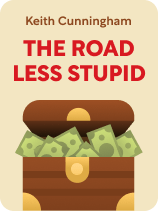

This article is an excerpt from the Shortform book guide to "The Road Less Stupid" by Keith Cunningham. Shortform has the world's best summaries and analyses of books you should be reading.
Like this article? Sign up for a free trial here.
What’s the problem with pride in a business setting? How can failing actually help you?
Confidence is a great thing to have as a leader or entrepreneur, but it’s another thing to be too prideful. According to The Road Less Stupid by Keith Cunningham, pride can cloud your judgment on important decisions that increase risk for your company.
Let’s look at why pride can turn into a problem for leaders.
Letting Pride Cloud Your Judgment
According to Cunningham, letting your emotions influence your business decisions will almost always result in stupid mistakes, which, in turn, will result in financial losses. One of the most dangerous emotions of all is pride because it can cause you to ignore risks or expect unrealistically easy profits.
He warns that the problem with pride is that if you have too much of it in your past successes can inflate your ego and give you unfounded confidence in the future success of your projects. In recounting his own greatest financial losses, Cunningham observes that one of the few good things about failing badly is that it humbles you. One humbling failure can help you view future projects more objectively because it takes humility to learn new things and assess your own ideas honestly, both of which are important for anyone directing a business.
But even if you’ve been humbled by failure, he says it’s helpful to have someone else who can review your proposals without getting emotionally involved. This second check helps keep your pride in check and prevents a lot of stupid mistakes. Many businesses have a board of directors for this purpose.
| More Dangers of Pride In Ego Is the Enemy, Ryan Holiday elaborates on how egotism (an elevated sense of self-importance) can sabotage your career. He corroborates Cunningham’s observations that sometimes ego can drive you to ignore obvious problems with a plan or venture—even when other people confront you with them—and rush into projects without first developing the capabilities you would need to make them succeed. But Holiday points out that sometimes ego can also have the opposite effect: It can prevent you from moving forward with important projects because you spend so much time talking yourself up that you feel you’ve already achieved success. This not only robs you of motivation to move forward but also of the time and mental energy needed to actually work on the projects that you envision succeeding. Holiday also echoes Cunningham’s emphasis on the importance of learning and of being humble enough to learn. But where Cunningham suggests that your failures can help to humble you and put you in a better mindset to learn, Holiday warns that sometimes ego can even prevent you from learning from your failures: Pride can drive you to blame your failures on other people or circumstances, blinding you to mistakes you could otherwise learn from and creating resentment instead of humility. Resentment makes it harder to move on to something new, where you’d have another chance to succeed. |
Pride Causes You to Ignore Risk
As we’ve alluded to, pride can blind you to risks, and ignoring risks can precipitate stupid mistakes. For that matter, Cunningham argues that the idea that higher risks correlate to higher returns is a stupid misconception. On the contrary, higher risk just means a lower probability of success.
(Shortform note: The correct way to understand the correlation between high risk and high returns is that a venture needs to offer higher returns in order to justify higher risk. But, as Cunningham points out, higher-risk options don’t necessarily offer higher rewards in practice.)
The better you understand what could go wrong on a given project or venture, the better you’ll be able to avoid stupid mistakes and foolish gambles, whether you’re comparing the risks of several possible projects, or deciding what risks to focus on mitigating in a project you’re already working on. He says the key to assessing risks is to write them down so you can compare them side by side—trying to analyze them in your head invites stupid mistakes.
As you write them out, you can begin to quantify them by estimating their probability of happening, how much loss they would incur if they did happen, and how difficult it would be to reduce the probability or the cost. Once you’ve done this, he advises you to sort them by probability and focus on the top 10 most probable risks for any given venture. This gives you an idea of what could most likely go wrong and how serious the consequences would be. If you couldn’t live with the consequences of any given risk, or if the expected payoff isn’t enough to justify the risk of loss, don’t undertake the venture.
| The Risk of Inaccurate Risk Assessments As Cunningham says, writing out your risks side by side can help you compare them objectively, facilitating better decisions. But only if the cost and probability of each risk is reasonably accurate. Error or uncertainty in these values introduces the risk of making the wrong decision based on a faulty risk assessment. Let’s consider a couple of factors that throw off the accuracy of your risk assessment. Analysts warn that it’s easy to underestimate the seriousness of risks if your data isn’t sufficiently detailed. For example, suppose that your company has 1,000 customers distributed throughout the US and 20 other countries. That makes the risk of changing customer preferences seem pretty low because it would take a truly sweeping global change to affect your entire international customer base. But what if 75% of your profits come from just 10 large customers, all of whom operate in the same industry and are based in southern California? This detail increases both the cost and the likelihood of the risk because a change to their industry, California’s regulatory code, or other local factors could influence their preferences simultaneously. Some experts, such as Nassim Nicholas Taleb, also caution that it’s easy to underestimate the risk of low-probability events that could have catastrophic consequences. In Fooled by Randomness, Taleb argues that humans tend not to prepare adequately for low-probability events because they confuse assessing risk (which you can do objectively) with predicting the future (which no one can do accurately): If the probability of a certain risk is very low, we tend to assume that it won’t happen, so we don’t take action to mitigate it. However, he argues that if consequences are severe enough, even a low-probability risk can warrant significant mitigation because the value of the risk is equal to the probability of it happening multiplied by the cost or consequence. Cunningham’s recommendation to focus only on mitigating your top 10 most likely risks arguably succumbs to this tendency to underestimate the risk of low-probability events. |
Pride Causes You to Expect Profit Without Effort
Cunningham also lists greed, laziness, and impatience as consequences of pride that lead to particularly stupid mistakes. Sometimes laziness and impatience can drive you to abandon a business venture that would have been very profitable if you’d been more persistent.
Greed, laziness, and impatience also make you vulnerable to get-rich-quick schemes. Cunningham asserts that anyone who promises to teach you how to make millions of dollars with minimal effort, regardless of your situation, is just guessing that you’re lazy and greedy and trying to take advantage of you. He says sustainable success always requires sustained effort and a clear focus on the right tasks. Furthermore, the tasks that you need to focus on depend on the situation. Thus, any legitimate business consultant will ask a lot of questions and take the time to learn your situation before offering any advice about how to make your business more successful.

———End of Preview———
Like what you just read? Read the rest of the world's best book summary and analysis of Keith Cunningham's "The Road Less Stupid" at Shortform.
Here's what you'll find in our full The Road Less Stupid summary:
- That the secret to financial success is to avoid making stupid mistakes
- The most common stupid mistakes executives make and how to avoid them
- Why doing what you love does not always translate to making money






